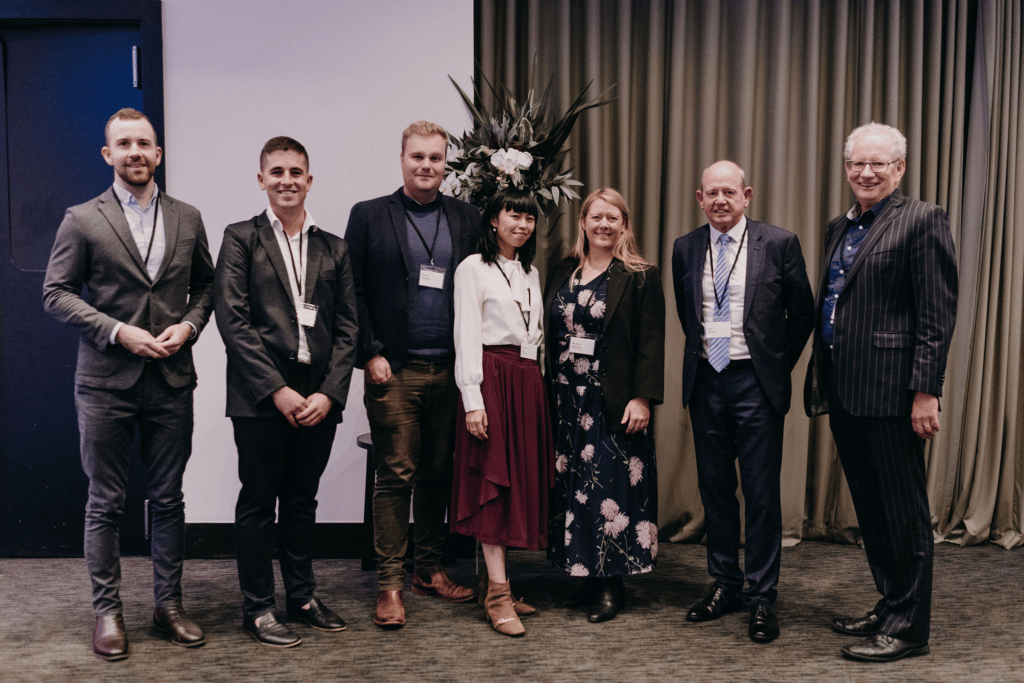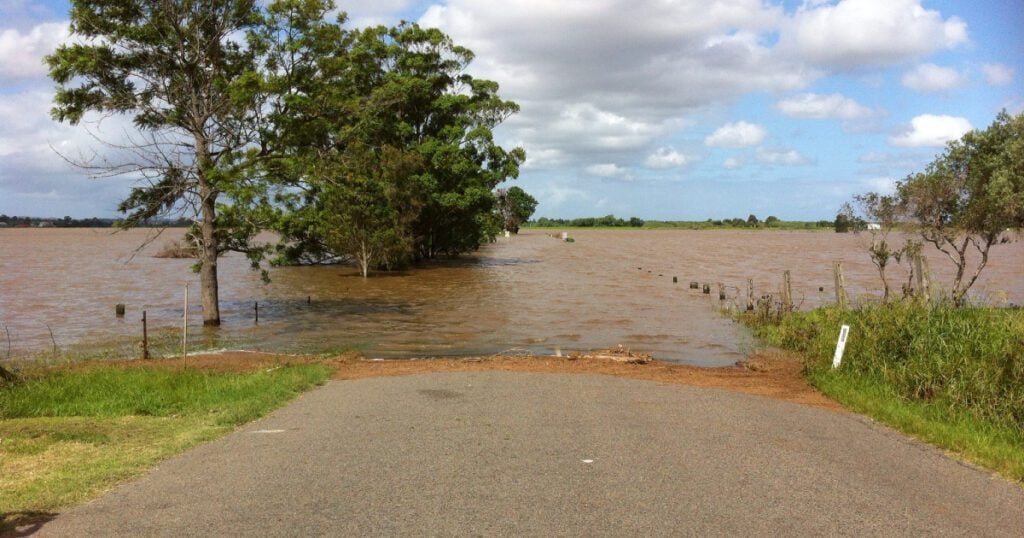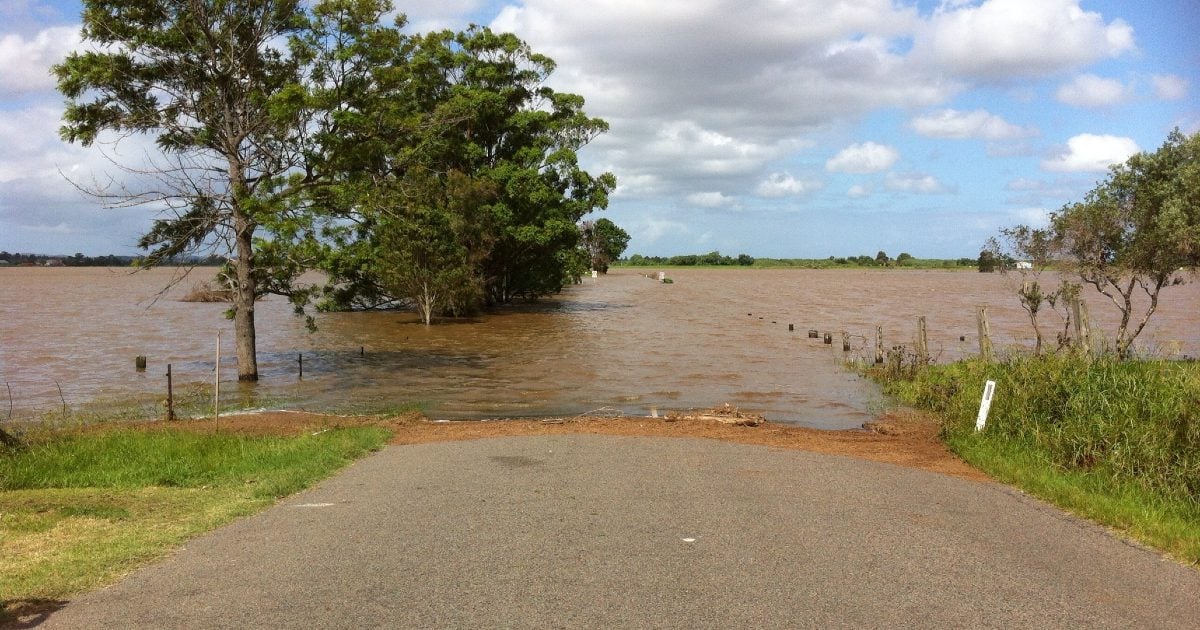Burling and Tuke on building a better Aotearoa
America’s Cup winners and Olympic gold medalists, Peter Burling and Blair Tuke share their knowledge on how to make an environmental and social impact.

From left: Blair Tuke, Laura McGoldrick, Chris Cunniffe - TMNZ CEO, Ian Kuperus - TMNZ Founder and Peter Burling
TMNZ and the Whakatupu Aotearoa Foundation share the vision of a restored and thriving New Zealand, and we are proud to partner with like-minded organisations as we strive to build a better future for Aotearoa and its people.
In June, we welcomed Peter Burling and Blair Tuke, founders of Live Ocean and co-CEOs of the New Zealand SailGP Team. At Pilkingtons in Auckland CBD, the duo spoke to TMNZ clients about building their ocean conservation organisation, Live Ocean Foundation, and their goals to make a meaningful impact on ocean health in New Zealand.
The yachtsmen set up the charitable entity Live Ocean Foundation just before the Tokyo Olympics and recently launched Live Ocean Racing, which is a sailing team with a current focus on female development in high performance foiling boats. The Foundation partners to scale up local marine science, innovation and outreach with global implications.
At TMNZ, our clients are a key part of what enables us to direct 100% of our profits to Whakatupu Foundation Aotearoa for initiatives that enable Aotearoa to thrive. One of the organisations we fund is Live Ocean Foundation, and our recent event allowed us to demonstrate the great work undertaken by the organisation.
Peter and Blair have an inspirational story to tell. Both spoke passionately about their reasons for setting up their purpose-driven venture, using their careers to make an environmental impact, and their pride in winning the first-ever SailGP Impact League trophy.
Ocean challenges and opportunities
The duo spoke about their love of the ocean from an early age, how that has shaped their careers, and the formation of the Live Ocean Foundation.
Blair, from Kerikeri in Northland, says he was “lucky” to have grown up in New Zealand, living close to the ocean, and spending most of his life out on the water.
A key moment for both arrived in 2017-2018 after Blair and Peter took part in the round the world Ocean Race. The vastness and beauty of the ocean prompted the pair to apply their skills and use their platforms for a healthy ocean.
“We saw some really unique places around the world,” says Blair. “We saw the power of the ocean, and realised what we could do with our profile and position.”
Peter, from Tauranga, says it is vital for the planet to have a healthy marine environment, as 94% of New Zealand’s country-wide area is covered by ocean.
“As a nation, we have a big contribution to make on the world stage. But we are a long way behind in terms of the way we look after the ocean and our conservation policies. We have a big opportunity to make some incredible steps forward.”
Live Ocean’s purpose
The pair’s Live Ocean Racing team competes in international events and raises awareness about ocean conservation.
Blair says the team has “purpose in its DNA”.
“We wanted to use our sporting platform right from the foundation’s inception. It’s a team that races on, and for, the ocean.”
Live Ocean Foundation is an official charity partner of the New Zealand SailGP Team that competes in the elite international sailing competition SailGP, further raising its profile.
“It’s amazing to have our purpose baked into the sport,” says Peter. “You get to reach so many people you wouldn’t otherwise with important environmental messages.”
Peter and Blair attended the UN Ocean Conference in late June as part of their efforts to raise ocean awareness, meeting with the UN’s Special Envoy for the Ocean, Peter Thompson.
The pair said they were surprised at how quickly the international community had supported them.
“It’s amazing to see people getting behind us. But New Zealand has got lots of areas where we need to step up to meet international standards but we need to also do that in a way that’s unique to our country,” Peter adds.

World impact
While SailGP is the first climate-positive sport and entertainment property, it has ambitious targets to further reduce its carbon emissions - going beyond the UN Sport for Climate Action goal to make 50% absolute cuts by 2030 and achieve net zero by 2040.
Peter says the competition is taking “strong measures to try and mitigate its footprint”.
In a world-first for a sporting competition, SailGP is rewarding teams for their environmental performance. The competition’s Impact League ranks each team against environmental and social criteria, ranging from clean energy usage to food waste.
The New Zealand SailGP Team won the first edition of the Impact League, taking home US$100,000 for the Live Ocean Foundation.
Blair calls the trophy “a seriously proud moment for the team”.
“I’m proud of our team for using our voice, and seeing the enthusiasm to be better. All of the teams in SailGP are improving, and that’s ultimately what we’re all after, for everyone to lower their footprint.”
Personal responsibility and the role of business
When asked how New Zealand businesses should consider a purpose-led journey, Peter urges companies to think big.
“Be ambitious,” he urges. “Try and be passionate about what you’re doing. We’ve been lucky to find something we are passionate about, but there are so many worthy issues out there.”
Blair offers advice to any company considering putting environmental or social impact at their core.
“Find an issue you identify with. That means you’ll be able to integrate it within your business or life more easily. We’re fortunate with Live Ocean because it’s linked to everything we do every day.”
Find out more about Live Ocean here.
See other ways we’re helping to build a restored and thriving Aotearoa here.
Tax Policy Scholarship showcases the next generation of talent
Four bright young industry minds have emerged as finalists in this year’s Tax Policy Scholarship Competition, an annual prize hosted by the Tax Policy Charitable Trust.

The biannual competition, which supports the continuation of leading tax policy research and thinking in New Zealand, enters its fourth round in 2022. The first competition was run in 2015.
The scholarship is designed to inspire the next generation of tax industry leaders. This year, entrants under the age of 35 were invited to propose significant reforms to our current tax system or analyse potential weaknesses and unintended consequences from existing laws, and propose changes to address them.
Entrants were asked to tackle one of three topics: environmental taxation, tax administration, or the powers granted to the Commissioner of Inland Revenue to collect information for tax policy purposes. Participants were invited to address the topics with creative ideas backed up by reasoned research and analysis.
We are delighted to announce the four finalists for this year’s competition, selected by our panel of leading tax industry professionals.
Daniel Doughty
Daniel is a Senior Consultant with EY in Wellington. He has proposed the introduction of a small business consolidated reporting regime to simplify tax reporting for small companies.
The regime would consolidate pre-existing tax obligations into a single report to be filed every second month. Inland Revenue would send an automated income summary out at the end of the year, similar to those currently prepared for individuals.
Mitchell Fraser
Mitchell is a Tax Solicitor with Mayne Wetherell in Auckland. Mitchell is concerned that the recently-expanded powers granted to Inland Revenue to collect information for tax policy purposes could create unintended consequences.
He believes the new powers risk political interference, conflicting with the IR’s need to be politically neutral. Mitchell proposes identifying alternative means to collect this information, including through Statistics New Zealand.
Vivien Lei
Vivien is Group Tax Advisor with Fisher & Paykel Healthcare, and finance lead with the Fisher & Paykel Healthcare Foundation.
Vivien proposes to change New Zealand’s environmental practices through the introduction of an impact-weighted tax regime. Under this model, organisations would be taxed on their net positive or negative impact on the environment.
Jordan Yates
Jordan is a Senior Tax Consultant with ASB in Auckland.
Jordan believes the tax policy landscape is fractured, and suffocated by political roadblocks. His proposal is to establish an independent statutory authority that would be responsible for the independent management of fiscal policy, as it relates to the tax base.
Selecting a winner
The finalists were announced on 2 June, and each will go on to develop a 4,000-word submission on their proposal.
The four will be invited to present their final proposals and answer questions at a function in October 2022. The winner will be announced that evening.
Our Tax Policy Scholarship Competition celebrates creative thinking from young professionals and also provides a springboard for the brightest industry minds to develop their careers.
Nigel Jemson, the winner of the 2019 competition, says: “Entering the competition was a terrific opportunity for me to grow and develop my tax policy thinking and connect with leading minds in the tax community. Winning the competition has given my career a boost and since, I have enjoyed a range of great roles in tax for leading businesses, Spark and PwC, and continued my involvement in and passion for New Zealand tax policy.”
Chris Cunniffe, Tax Policy Charitable Trust Committee Member and TMNZ Chief Executive, says this year’s entries underline the strength of the next generation.
“We’re consistently delighted with the breadth and the freshness of thinking young people bring to this competition. The competition provides a forum to share ideas, and secondly, ensures that creative tax policy is not the sole domain of people who have worked in the industry for a long time. As an industry, we are open to fresh thinking and new ideas.”
Tax Policy Charitable Trust Chair John Shewan says the entries prove the industry’s future is in good hands.
“New Zealand has been very fortunate to have so many competent tax leaders involved in developing policy for the betterment of our country. It’s very exciting to be around the next generation of future tax policy influencers, who are already, at a young age, focused on innovative opportunities to enhance the tax landscape.”
Michelle Redington, Chief Tax Counsel at Inland Revenue, who was the guest speaker at the event where the four finalists were announced, says it is fantastic to see the Tax Policy Charitable Trust create opportunities for the next wave of tax policy thinkers.
“Throughout my career, I have been very lucky to be supported by some of New Zealand’s preeminent tax leaders, who have been fantastic teachers and mentors,” she says. “I’ve enjoyed a diverse career in tax, spurred on by a need to solve complex problems, and I’m proud to be able to give back to the next generation of talented tax enthusiasts.”
Find out more about the Tax Policy Scholarship Competition, here.
TMNZ’s sustainable office: how we moved and improved our environmental footprint
Our new Auckland office aligns with our ambition to build a more sustainable future for Aotearoa. Here’s why we made the move.

When we kick-started the process of finding a new Auckland home last July, we were eager to do things differently and place a strong emphasis on sustainability. At TMNZ, we’ve always been conscious of the environment, but we wanted to go a step further as we developed our new corporate headquarters.
We wanted to ensure people and the environment were at the heart of our new workspace design. We needed to find the right setting for our Auckland employees and develop an office that would help us become more sustainable. Moving required a holistic approach, incorporating climate change, environmental degradation, and waste mitigation.
“We wanted to create a great workplace for our people to enjoy. They were involved throughout the project,” says Amanda Thorpe, TMNZ’s Head of People and Culture. “Our people helped us select the office space and we ran engagement sessions with employees to discuss aspects of the design. We worked together to make our vision a reality for both TMNZ and the Whakatupu Aotearoa Foundation, as we continue to support the trust’s philanthropic efforts.”
The environment is a big focus for TMNZ and the Whakatupu Aotearoa Foundation. Through the Foundation we look to invest in initiatives that tackle climate change, environmental degradation, declining biodiversity, and waste. It was very important to us to give the same environmental focus and attention to the design of our new workplace.
Building a sustainable home
We selected an office at 23 Customs Street in Auckland and enlisted Peter Doyle, from NOWW Advisory and Wingate Architects, to help us build an eco-friendly workspace. Together we explored how we could reduce our environmental footprint with each decision.
”Materials used in the new space have been chosen with sustainability in mind,” says Sarah Bryant, Associate Senior Interior Designer at Wingate Architects. “TMNZ’s new home features Jacobsen’s carpets made from recycled drinking bottles, Tarkett hard floors manufactured from recycled PVC, and Green Tag Certified Autex Cube ceiling tiles, made with at least 40 percent recycled materials.”
We selected sustainably-sourced mataī joinery and panels, and recycled rimu tables. We also chose sustainable furniture fabrics for every chair and stool.
No detail was too small; desktop surfaces at TMNZ are now made of all-natural linoleum, produced from pure oxidised vegetable linseed oil and natural pine rosin. We also made use of recycled products, including a reused office pod that hosts our breakout meetings.
Making an impact, without waste
While we took a careful approach, moving from one place to another inevitably produces waste. In our case, much of our old furniture was no longer suitable for the new office. Our people worked to find a solution and struck upon an idea to recycle and make a social impact at the same time.
To ensure nothing went to landfill, we teamed up with All Heart NZ, a charitable organisation that works with corporates to redirect and repurpose unwanted corporate and construction items. The organisation offers ‘Reduce partnerships’, which help to further develop the sustainable, ethical, and social aspects of procurement and supply chain management. All Heart NZ has established a national circular solution for redundant corporate items, which creates employment, volunteerism, and training opportunities while supporting local community need.
All Heart NZ helped us to achieve a positive social and environmental outcome by redirecting 216 items weighing more than 6,500kgs. With items reused, repurposed, and resold, 100 percent of the benefit went to New Zealand communities in need.
Joe Youssef, All Heart NZ’s Founder and Chief Encourager says: “We know that improving the ways we source and dispose of corporate goods can positively impact our planet and people. We partnered with TMNZ to redirect all redundant materials in preparation for their office move. Together we created a sustainable solution and community impact to be proud of.”
Through our partnership, we added $16,700 in community impact value and avoided 7.6 tonnes of carbon emissions. All Heart NZ’s partnerships have supported 439 different communities throughout Aotearoa and the Pacific, helping them save or raise more than $9.1 million, while at the same time assisting corporate partners to divert more than 3.7-million kilograms from landfill.
A welcoming space for our people
Our office was designed for our people. Collaborative spaces and new technology will enable us to work together and with our customers and partners regardless of where they are in New Zealand. Technology including whiteboard cameras, immersive collaboration spaces and fully cable-free working will make us more connected than ever and reduce the need for unnecessary travel. What’s more, we have chosen technology suppliers that lead in terms of their sustainability commitments while at the same time provide a seamless employee experience.
We moved into our new workspace in March, and our environmental sustainability efforts continue. We have made an ongoing commitment to reduce waste sent to landfill and we’re constantly exploring new ways to improve.
TMNZ and the Whakatupu Aotearoa Foundation have a shared vision of a “restored and thriving Aotearoa”. Our new workspace will allow both organisations to come together with clients and charity partners in an open, inviting environment — one that has been designed to limit the impact on future generations.
While COVID-19 restrictions have prevented us from welcoming visitors into our new home so far, we look forward to showing customers and charity partners our new surroundings in the months to come as we mark new chapters at TMNZ and the Whakatupu Aotearoa Foundation.
Survey indicates property market cooling due to confusion
News release: Chartered Accountants Australia and New Zealand and Tax Management New Zealand
26 November 2021
A survey of chartered accountants and tax agents has revealed that incoming legislation intended to help cool New Zealand’s over-heated housing market is already having a major effect on investors – but largely because of confusion and lack of detail rather than clear policy.
The annual survey, jointly run by Chartered Accountants Australia and New Zealand (CA ANZ) and TMNZ, sought the views of 361 accountants in public practice, on recent tax policy developments.
Among the findings, the survey revealed that 70% of respondents have already seen clients change or voice their intention to change their residential property investment behaviours due to ongoing changes to the extended bright-line test, and proposed changes to deny interest deductions.
CA ANZ NZ Tax Leader John Cuthbertson said that further results from the survey show to key factors in play; the complexity of the proposed rules, and uncertainty as the details could change before the legislation is enacted in March 2022, despite the bright-line and denial of interest deductions coming into play from earlier this year.
“The survey suggests that the housing market has been given a policy placebo, in the form of legislation that is influencing behaviour before it is fully developed and enacted.”
“Residential property purchasers and investors typically react to the specific detail of legislation. However, in this case the market appears to be reacting to the complexity of the proposed legislations carveouts and inconsistencies, and the fact that it won’t know exactly what is in place until March 2022, despite it being backdated to capture activity in 2021.”
“To be fair, the Government’s aim was to cool down the overheated housing market, which is causing a range of economic and social issues, but we’re not sure this is the best way to do it.”
The survey shows that over 21 per cent of the respondents, or 1 in 5, feel ‘not at all confident’ about advising clients on the proposed new build interest limitation rules, and over 65 per cent of participants felt the phase out and denial of interest deductions would be somewhat or extremely difficult to comply with.
Similarly, almost 50% of respondents said they were either somewhat confident, or not at all confident on advising on the new build bright-line test.
“Because this policy hasn’t been developed in line with the generic tax policy process (GTPP), there’s a much higher chance of unintended consequences and collateral damage. The survey shows a considerable lack of confidence in how the legislation will work, and that will likely result in non-compliance and issues around who is captured and who isn’t.”
“It’s important to note that the level of complexity encountered will depend on the number of properties owned, banking arrangements in place and the mix of interest limitation rules and concessions in play,” added Mr Cuthbertson.
TMNZ Chief Executive Chris Cunniffe said the survey provides a good indication of how the proposed rules would be rolled out.
“In their current complex form, there’s likely to be a lot of variability in compliance with these laws. Especially as not everyone has a tax agent or accountant helping them.”
“While the extension of the bright line test to 10 years might land well for most mum and dad property owners, the denial of interest deductions and how that relates to new builds is likely to be misunderstood.”
“There’s opportunity for Government to provide greater clarity on the law changes and simplify certain aspects to help owners and accountants alike.”
New Survey Shows Inland Revenue Helpful, But Hindered
Press Release: Chartered Accountants Australia and New Zealand and Tax Management New Zealand
24 November 2021
Helpful, but hindered is the overarching finding in a new survey digging into public practice accountants’ experiences with Inland Revenue (IR).
Conducted by Chartered Accountants Australia and New Zealand and TMNZ, the survey of 361 members in public practice asked a range of questions about the timeliness of IR’s service, the quality of interaction, and the business support on offer.
“Over 80 per cent of those surveyed rated their agent account manager interactions positively over the last 12 months, which Inland Revenue should be pleased with,” said CA ANZ NZ Tax Leader John Cuthbertson.
“The flipside is that it is taking much longer for Inland Revenue to resolve queries. The number of public practitioners who say it’s taking more than 6 days to resolve their queries has risen from 5 per cent of respondents, to 47 per cent.”
Despite this, accountants and tax agents are positive about not only their interactions with account managers, but also the support measures that Inland Revenue has administered.
“Accountants and agents across New Zealand are telling us that the tax support provided by Inland Revenue has been as effective this year, as it was last year,” said Tax Management New Zealand Chief Executive, Chris Cunniffe.
“It’s been another turbulent year for businesses, and the tax relief and support measures have made a positive difference. It’s just that our survey shows it can take a while to get through to Inland Revenue, and to have queries resolved and assistance locked in.”
The appreciation of Inland Revenue’s support was illustrated by 85 per cent of participants reporting that they had clients who utilised the remission of interest and penalties for late payment of provisional tax due to COVID.
Additionally, over 71 per cent of participants have found it easy or not difficult, to enter into or assist clients with an instalment arrangement in the past 12 months. This covers all types of tax, including GST, PAYE and FBT, not just provisional tax.
The increased level of scrutiny and information required to access COVID support was also felt by survey respondents.
“Approximately half the survey respondents said that accessing COVID support was harder than in 2020. That’s not surprising, given the public’s desire for more scrutiny about who received support, and the declarations becoming more stringent during this year’s lockdowns,” concluded Mr Cuthbertson.
Syncing provisional tax to cashflow
As a self-employed painter and decorator, Bart Taylor knows full well how business owners can get themselves into strife if they don’t plan for their tax obligations.
He speaks from his own personal experience.
That’s why Bart is happy to talk about how TMNZ enables him as a self-employed tradesperson to take the stress out of having to pay provisional tax on dates dictated by Inland Revenue (IR).
TMNZ offers Bart the flexibility to make the payments when it suits his cashflow.
As someone who doesn’t always get paid every week, that’s important because it offers his business some breathing space while he waits for the money he’s earned from completed jobs to land in his bank account and ensures that other important invoices can be paid in the meantime.
A bit about Bart
Bart owns and operates his own business in Christchurch.
He’s a one-man band and that’s the way he likes it. Plus, most of his work means he does not require a crew, although he will occasionally use contractors when required or on larger jobs.
Bart has been his own boss since 2013, when, at the age of 24, he decided to make a go of this painting lark on his own. The market in the Garden City was awash with painting gigs during the rebuild and becoming self-employed seemed like a low-risk move.
Fast-forward nearly eight years and his gamble has paid off. He is enjoying the benefits that come with self-employment and, as a husband and father in a young family, the better work-life balance he has achieved.
Tough tax lessons
Yet that’s not to say that everything has been a bed of roses during that time.
“Becoming self-employed has been a bit of a rollercoaster. Lots of learnings, lots of difficult times, hard times,” says Bart.
“First and foremost, I’m a tradesman, so I am a worker. The back office, the organisation, the financial side of things is not my strong point. With the tax side of self-employment, I managed it very poorly for years because I was so young.”
Like other business owners, Bart wasn’t as prepared as he should have been and was “stung” in his second year of trading. That was when two years’ worth of tax was due. Ouch.
He admits having to pay provisional tax was “rough for a little while”.
“In the trade industry, you don’t always get paid every week and you need cashflow to run your business,” explains Bart.
“My accountant saw there was a risk of if we paid that tax bill in full, that I might fall short in other areas and he wanted to make sure that my relationship with my trade suppliers stay good and that the invoices I need to pay get paid on time, not just the IR ones.
“He recommended Tax Management NZ and that freed up cashflow.”
Breathing space from IR to manage cashflow
That’s because TMNZ gives Bart the flexibility to pay his provisional tax when it suits his business, without the consequences of steep IR interest and late payment penalties.
It operates with the blessing of the taxman, too.
TMNZ makes a date-stamped payment to IR on Bart’s behalf on the date his provisional tax is due. Bart pays TMNZ at a time when it suits his cashflow.
TMNZ transfers the date-stamped payment to Bart’s IR account and IR treats it as if Bart himself has paid on time. This eliminates any IR interest and late payment penalties showing on his account.
“Sometimes the option of TMNZ, to be able to borrow some money for a short period of time, to make sure you hit that IR deadline, frees you up with your cashflow until that payment [you are waiting on] comes through,” says Bart.
“The fee of using Tax Management NZ is so low and affordable in comparison to the failings of if you ran out of money in that time, or the scramble and the stress, so it’s definitely worth it.
“It’s changed my perception around making these tax payments. It takes the stress off of it.”
And how does dealing with TMNZ compare to dealing with IR?
“You get a bit more of a personal touch with Tax Management NZ because you get a prompt response and it’s not a cookie-cutter [reply].”
Bart is one of many small business owners throughout New Zealand who benefits from the provisional tax flexibility TMNZ offers. Get in touch for more information about our service or if you have any questions. We're happy to help. Alternatively, register with TMNZ to explore tax pooling for yourself.
Cashflow relief for farmers impacted by flood or drought

Those impacted by flooding in Canterbury or drought elsewhere in New Zealand have another option to manage their cashflow.
It’s called tax pooling.
It lets taxpayers defer their upcoming provisional tax payments to a time that suits them, without incurring interest (currently seven percent) and late payment penalties from Inland Revenue (IRD).
The service – which has been operating with the blessing of the taxman since 2003 – is available through an approved commercial provider such as Tax Management NZ (TMNZ).
The impact of extreme weather
The Government has declared the recent flood in the Canterbury region as a medium-scale adverse weather event.
As those in this part of New Zealand assess the damage and begin the clean-up following the large deluge of rain, a big dry is beginning (or, in some cases, continuing) to bite other parts of New Zealand. The drought has been classified as a large-scale adverse weather event.
Farmers impacted by these contrasting weather events are being encouraged to act early and assess their options if they need assistance.
For those battling drought, some tough decisions around stock and feed will need to be made. In the Canterbury region, flooding only compounds the financial pressure as many were also dealing with drought beforehand.
Cashflow will be important during this difficult period.
Help is available
Managing tax payments will be a key consideration in managing cashflow too.
IRD, to its credit, is exercising some discretion.
It will allow farmers and growers affected by the Canterbury flood to make early withdrawals from the income equalisation scheme.
For those whose current or future income will be significantly affected by drought, IRD will allow late deposits for the 2019-20 income year up to 30 June 2021.
Early withdrawals are also available in the case of a medium-scale adverse event or if someone is suffering serious hardship.
Please note a taxpayer must satisfy certain criteria for IRD to exercise its discretion around the income equalisation scheme.
There's also the option of re-estimating provisional tax.
However, while that allows someone to get a refund of tax they have paid earlier in the year, it does come with some risk.
Free up cashflow by deferring payment of provisional tax
Farmers growers with a May balance date are due to pay their the final instalment of provisional tax for the 2020-21 income on 28 June.
For a small interest cost, someone can use TMNZ to defer this payment.
We make a date-stamped tax deposit to IRD on behalf of a taxpayer on 28 June and the taxpayer pays us when it suits their cashflow.
A taxpayer can either pay the full tax amount at a date of their choosing or enter an instalment arrangement.
When a taxpayer satisfies their arrangement with TMNZ, IRD will treat it as if the taxpayer had paid on time. Any interest and late payment penalties showing on their account will be remitted.
A taxpayer has up to 12 months to pay their 28 June provisional tax with TMNZ.
TMNZ’s interest cost is much cheaper than what IRD charges when someone pays their tax late.
Please click here to register with TMNZ. Alternatively, feel free to contact us if you have any questions.
Can AIM taxpayers use tax pooling?
A taxpayer cannot use tax pooling to defer payment of, or settle, provisional tax instalments calculated under the accounting income method (AIM).
However, TMNZ can help AIM taxpayers with terminal tax or when they receive a notice of reassessment.
What does tax pooling legislation say about AIM?
Legislation in the Income Tax Act 2007 clearly states that a taxpayer can use tax pooling funds to satisfy “a provisional tax liability other than under the AIM method”.
Please refer to sections RP17-RP21 of the Act for further information.
Why IR doesn’t allow tax pooling to assist with AIM payments?
Inland Revenue (IR) says tax pooling manages taxpayers’ uncertainty around provisional tax payments and their exposure to interest.
Consistent with this objective, tax pooling is not currently available for tax types where someone has certainty of their liability at the time of payment (for example, GST).
Given the payments made under AIM are calculated on actual accounting profit, taxpayers will have certainty about what's due.
As such, it's IR’s view that it's not appropriate to allow tax pooling for provisional tax payments calculated under AIM.
What does that mean for you?
IR will reject the use of any tax pooling funds to satisfy an underpaid AIM instalment. As a result, late payment penalties and interest will continue to show on a taxpayer account.
They will, however, accept the use of tax pooling funds to settle a terminal tax liability. The same applies if an AIM taxpayer has additional tax to pay after receiving a notice of reassessment.
Please be mindful of these facts when entering arrangements with TMNZ.
It’s also an important consideration before electing to use AIM to calculate provisional tax.
That's because paying tax when income is earned is not necessarily the same as when cash is received.
If someone is unable to pay an AIM instalment on time or in full due to cashflow constraints, the safety net of tax pooling will not be available to reduce their exposure to interest and eliminate late payment penalties.
Feel welcome to contact us if you have any questions.
Make IR interest, late payment penalties disappear
A missed or underpaid provisional tax payment often means a taxpayer is faced with a steep interest cost and potentially late payment penalties on top of what they owe.
However, tax pooling can make that go away.
A big frustration with Inland Revenue (IR) is that it expects taxpayers to pay the correct amount of tax on the dates it sets. No ifs, no buts.
Fail to adhere to this rigid timetable or underpay and you will face the consequences.
IR charges interest – 9.89% as at 8 May 2025 – from the date the payment was due until you pay the outstanding amount.
Late payment penalties may also apply as follows:
- One percent the day after payment was due.
- An additional four percent if the tax amount (including late payment penalties) remains unpaid after seven days.
A tax pooling provider such as TMNZ operates with the blessing of IR. It can be of assistance if taxpayers find themselves in this situation.
Where might this be useful?
In the event you missed your recent 7 May provisional tax payment – or any other instalment relating to the 2020-21 income year, for that matter – we can eliminate any late payment penalties for which you may be liable and significantly reduce the interest you pay.
You make your payment to TMNZ and we apply backdated tax that was paid to IR on the original date(s) it was due against your liability.
The taxman treats it as if you paid on time once it processes this transaction.
This wipes any IR interest and late payment penalties showing on your account.
You have the option of making to TMNZ a one-off payment at a date of your choosing or making regular instalment payments towards your liability over a longer period.
TMNZ gives you up to 13 months to pay your 7 May provisional tax for the 2020-21 income year.
Is your 2020 terminal tax overdue?
You still have time to use TMNZ to reduce the interest cost and eliminate late payment penalties if you have outstanding provisional or terminal tax liabilities for the 2019-20 income year.
However, you will have to act quickly.
Tax pooling legislation gives taxpayers an additional 75 days past their terminal tax date to pay their terminal tax.
If your terminal tax for the 2019-20 income year was due on 7 April 2021, you would have until 15 June to settle owe with TMNZ.
Reassessed by IR
TMNZ can also assist with historic income tax payments and other tax types such as GST and PAYE if you receive a notice of reassessment from IR.
You have 60 days from the date the IR issues this notice to use tax pooling.
Please contact us if you have any questions.
IR payment allocation rules explained
Provisional tax payments made on or before the date of the final instalment for the year are applied to the oldest overdue tax amount first while payments made after the date of the final instalment are applied to the interest owing on any overdue tax first, then the overdue tax amount.
The Inland Revenue (IR) payment allocation rules – which are found in s120F and s120L Tax Administration Act 1994 – also apply to payments made via a tax pooling provider such as TMNZ.
It’s important to understand how they work and differ from one another.
Detailed explanation
Section 120L covers provisional tax payments made on or before the date of the final instalment for the year.
It requires IR to apply a payment to unpaid tax in order from oldest to newest. Please note the unpaid tax amount(s) include late payment penalties.
Section 120F deals with payments that are made after the date of the final provisional tax instalment for the year.
It requires IR to apply payments, in the following order, towards:
- The interest accrued on the oldest unpaid tax amount until that interest is paid.
- The oldest unpaid tax amount until that tax is paid.
- The interest accrued on the next oldest unpaid tax amount until that interest is paid.
- The next oldest unpaid tax amount until that tax is paid.
- To each subsequent arising interest and unpaid tax amount using the pattern above, in time order that relevant unpaid tax arises, until they are paid.
Again, the unpaid tax amount in s120F includes late payment penalties.
The ramifications
These allocation rules mean a taxpayer may well find a tax payment they intended to be destined for a particular instalment date is allocated by IR’s system to earlier unpaid amounts first.
For example, let's say they may make a $10,000 payment on time and in full on 15 January 2021. However, if they failed to pay their 28 August 2020 (P1) provisional tax, then their $10,000 payment will be applied as per s120L to the overdue tax amount (including late payment penalties) at P1 first.
As such, this leaves them exposed to additional (and unexpected) late payment penalties and interest.
It does not matter if the $10,000 payment they made on 15 January 2021 is a date-stamped transfer from the account of a tax pooling provider. Please see sRP19 (1B) Income Tax Act 2007.
In other words, you need to clear the tax liability at all earlier instalment dates first.
How TMNZ can assist with missed provisional tax payments
It's best to purchase from TMNZ the backdated tax to cover the shortfall at the earlier instalment date.
This achieves two things.
Firstly, it eliminates late payment penalties and significantly reduces the interest cost on the underpaid tax.
That’s because the tax you are purchasing from TMNZ was paid to IR on the date it was originally due. IR will treat it as if you have paid on time once it processes your transaction with TMNZ.
Secondly, it ensures that any other payment that was otherwise made on time and in full will be allocated to the particular provisional tax date for which it was intended.
A taxpayer has up to 75 days past their terminal tax date for that tax year to purchase the tax they require.
For example, if you have a terminal tax date of 7 February 2021, you will have until mid-April to settle your 2020 income tax with TMNZ. Those with a 7 April 2021 terminal tax date have until mid-June.
Please contact us if you have any questions. We're happy to help.









